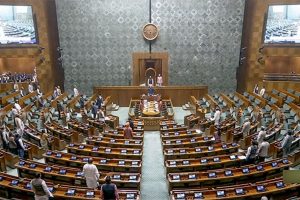In September 2021, Pew Research Center released a survey report on religion in Indian society. According to it, 84 per cent of the 29,999 people surveyed believe that religious tolerance is the hallmark of every Indian, though they also have close friends confined mostly within their own communities. National identity is found to be aligned with politics, with the BJP likely to garner more support among Hindus, but that is not unique to India. In the 2020 elections in USA, 81 per cent of White evangelical Protestants voted for Trump.
Nearly all Indians (97 per cent) believe in God. The report unequivocally confirms that to most Indians religion is very important. This is unlike the rest of the world, especially the countries in Europe, America and Africa, where surveys like the WIN-Gallup “Global Index of religion and atheism” etc. have repeatedly pointed out that there exists a strong negative correlation between religiosity of people and their income levels, contrary to the claims by the proponents of religion that religion impacts economic outcomes through its doctrines that promote thrift, work ethic, honesty and trust. It seems that the Marxian tenet of “religion is the opiate of the people” may be less true today than it was a century ago.
Advertisement
European countries experienced rapid secularisation starting in the 19th century. Another Pew Research Center Survey in January 2021 found that only 25 per cent people in Italy, 17 per cent in the Netherlands and 9 per cent in Sweden now regard religion as important to their lives, similar to people in Australia (20 per cent) Japan (17 per cent) or South Korea (9 per cent). In the USA, despite a shrinking share of people attending church or believing in religion, still 49 per cent Americans consider religion important. But the share is unmistakably shrinking.
Religion for centuries has served as a pivot for social cohesion, social order, discipline and compliance with the law. Religious conservatives have always warned that decline of faith will lead to a collapse of this cohesion and public morality. In the respected US magazine “Foreign Affairs”, Ronald Inglehart published the result of a study on declining religiosity across countries (“The Global Decline of Religion”, Sept-Oct 2020) which covered 49 countries accounting for 60 per cent of the world’s population. It demonstrated that between 2007 and 2019, an overwhelming majority of countries (43 out of 49) had become less religious, and the decline was evenly spread across the rich as well as poor countries. But these countries did not become more corrupt or more murderous, in fact the evidence points to quite the contrary. Less religious countries appeared to be less corrupt and have lower murder rates than more religious countries.
Going by the Corruption Perceptions Index of Transparency International, the highly secular Nordic states have some of the world’s lowest levels of corruption, and the highly religious countries, such as Pakistan, Bangladesh, Iraq, Tanzania, and Zimbabwe, India included, have some of the highest. Of course, religiosity does not cause corruption, but it is no longer a contributing factor to morality either. It may once have played a role in public morality, but now economic development seems to have usurped that role. While industrialisation and the spread of scientific knowledge did not cause religion to disappear till the last century when hunger, poverty and insecurity of life like ill-health were still pervasive, it now seems that as societies develop economically and states are able to provide better healthcare and social security, people tend to become less religious.
Inglehart also studied these countries from 1980s and found that there was an uptick in religious beliefs in the former Soviet-bloc communist countries after the disintegration of USSR, which can be explained easily by the severe decline of economic, physical, and psychological security subsequent to the collapse of USSR, and the vacuum was filled by religion. He pointed out that India remained an exception to the global trend and the period of his study (2007-2019) also coincided with the rise of the BJP.
Thinkers have long examined the relationship between religion and economic behaviour. In 1905, Max Weber attributed the modern advent of capitalism to the Protestant reformation, arguing that the ideological stage for the rise of capitalism had been prepared by Calvinist religious doctrines. In his 1926 classic “Religion and the Rise of Capitalism”, the Calcutta-born British economist Richard Henry Tawney further expounded Weber’s theme, arguing that the values of Calvinist Protestantism like individualism and ethic of hard work and thrift had fostered an efficient industrial workforce in northern Europe.
Now, in another book by the same name, the Harvard Professor Benjamin Friedman has argued that contrary to the widely held view of economics as an entirely secular product of the Enlightenment, religion has all along exerted powerful influence on economic behaviour throughout history, and in fact shaped what economics is today. Like everything else, religion also has its own economics, and the question that is engaging the minds of theologians and leaders of faiths in every country is how relevant religion is now, and how to attract the new generation of millennials who are more attached to their gadgets than faith in order to save religion from decaying into irrelevance.
As another seemingly uncontrollable wave of the pandemic looms ominously upon us with the dreadful prospect of locking us away from social gatherings including religions congregations and temple visits, it will have its consequent economic impact upon the financing of religious establishments. To survive in an uncertain world, where a highly disruptive pandemic, Covid certainly not the last one, may be a forever phenomenon and would threaten to shut the world from time to time, religions need to devise new strategies, especially with their gradually weakening hold over people. Industrial and scientific revolutions of the 17th and 18th centuries that ushered in rationality also brought prosperity.
In the “Wealth of Nations” (1776), Adam Smith compared churches with enterprises, similar to butchers, bakers and brewers. In a free, competitive market economy, where religions rely only on donations of followers to sustain themselves, the clergy must act with “zeal” and “industry” to attract and retain them in faith. Critiquing the Church, an enduring institution, Smith said it was “the most formidable combination that ever was formed against the authority and security of civil government, as well as against the liberty, reason, and happiness of mankind”. As the monopoly provider of religious services, it posed a formidable impediment to economic development.
To answer how it maintained its monopoly, as the Stanford Professor Barry Weingast had said, Smith developed “a rich and systematic approach to the incentives, institutions, and competition surrounding the medieval Church” in which the relationship between the secular and ecclesiastic lords was determined by their respective holds upon the masses. The secular lords (capitalist producers) could not control the masses on their own while the Church could, which gave it an advantage over the former: any attempt by them to appropriate the Church’s revenue or assets would be countered by the Church by turning the masses against them. Self-interest therefore motivated both to cooperate to exploit the masses and to maintain this equilibrium. The Church had to prevent economic growth because growth would bring wealth, power, and independence for the masses, undermining the Church’s ability to mobilize them against the secular lords. It was through the Reformation movement that masses gradually became less dependent on and less responsive to the Church, enabling separation of the Church from the State.
Another scholar, Larry Iannaccone, also holds that market forces constrain churches just as they do secular firms. Smith noted, “The clergy of every established church constitute a great incorporation. They can act in concert, and pursue their interest upon one plan and with one spirit….. Their interest as an incorporated body is never the same with that of the sovereign, and is sometimes directly opposite to it”. The situation becomes more problematic when only one religion is tolerated in society, but where “two or three hundred” religious sects are tolerated, “no one could be considerable enough to disturb the public tranquility”, and that will naturally lead to competition among them just like business entities, and therefore will be subjected to the laws and mechanisms of the market including competition, monopoly, government regulation and also mergers, acquisitions and bankruptcies when they fail to devise appropriate market strategies to stay afloat.
In a world with declining religiosity and increasing terrorism, open competition is the only way to ensure survival of the fittest, that is, the one that emerges as the most productive, most harmonious and most peaceful. Smith emphasised that allowing competition in religion would lead to a more tolerant government and more freedom for religion. Countries with more religious liberties are also the ones with higher levels of income. Religious beliefs and practices do converge when faiths coexist peacefully through most of history.
As the Pew Report of September 2021 pointed out, many Sikh (29 per cent), Christian (22 per cent) and Muslim (18 per cent) women wear a bindi, essentially a Hindu practice, and as many Muslims as Hindus (77 per cent each) believe in karma, as do 54 per cent of Christians. Traditional religions that propagate their rigid norms as absolute values are dangerously divisive and promote fanatical intolerance. They are clear misfits in the contemporary global society and are facing an existential crisis today. They have to reinvent themselves in order to survive. Competition demands specialisation, innovation and technology. It needs the clergy to be better educated, better informed and tech-savvy. Their failure to adapt will only hasten the decline of religion.
(The writer is a commentator, author and academic)










